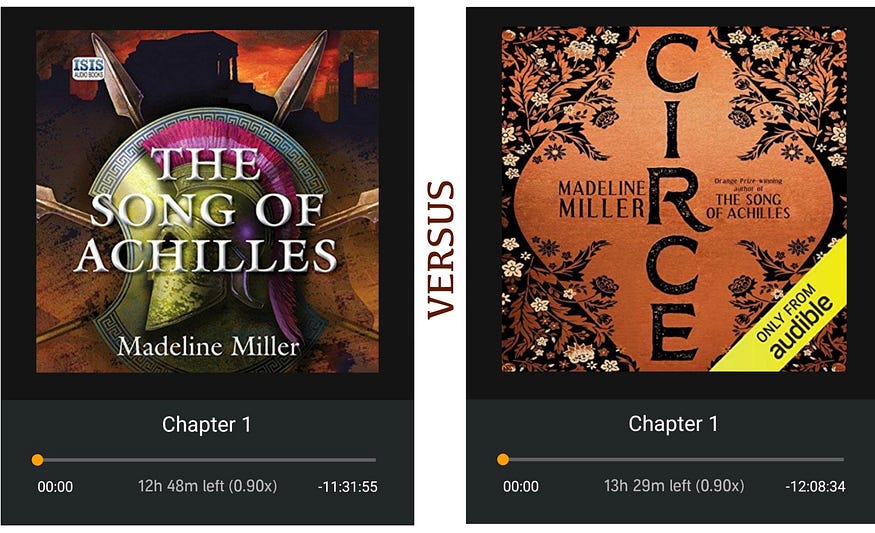Book Comparison: The Song of Achilles & Circe by Madeline Miller
(**First published on my medium account - https://nishaagni.medium.com/book-comparison-the-song-of-achilles-circe-by-madeline-miller-8e1ecd9c5f7)
I discovered Madeline Miller by accident. I had just received my Audible credit and given that I had my plate full at the time, I was in search of a book that was a breeze to listen to.
Circe’s appeal was instantaneous. Like Odysseus and Telegenous, I too was captivated by her magnetic charm. Hidden in the folds of Greek mythos and draped in millennia of mystery, she beckoned to me from the shores of her invisible island Aeaea – the one only those chosen by her have the privilege to see.
Achilles was a different matter. Already a hero in his own right, he was always there – visible like a giant block of finely- chiseled marble. The Aristos Achaion.
Since I had already listened to Circe, the choice to head towards another Miller work – and the winner of the Orange Prize for Fiction – The Song of Achilles – was an obvious one.
Once I had finished the two audiobooks, I couldn’t help but compare one with the other – as any reader is wont to do when he/she reads multiple works by the same author. Instead of just mulling over my feelings, I decided to present them in the form of a blog post.
So, without further ado, here is a detailed comparison between Madeline Miller’s Circe and The Song of Achilles. To make the comparison easier, I have divided the review into segments.
Adherence to the Epics
Both Circe and Achilles are important characters in Homer’s two greatest epics – the Iliad and the Odyssey. But Circe, being a Goddess, traces her history back to the Titans – the primordial Gods who ruled the world before they were overthrown and chased into the core of the Earth by Zeus and his band of Olympians. In comparison, Achilles makes his entrance much later – born thousands of years after Circe.
In terms of her adherence to the Greek mythos and the epics, Miller remains faultless. With a Masters in Classical Literature from Brown University and an MFA in Dramaturgy and Dramatic Criticism from the Yale School of Drama, she certainly has the credentials – and the expertise – that readers can trust, for an educated portrayal of Homer’s epics.
As someone who is already very familiar with Greek Mythology, I found that her portrayal of key events in both the books to be spot-on.
Narrative Perspective, Characterisation & Audience Connect
Circe is narrated by the Goddess herself. This adds a unique perspective to her story, since most of Greek mythos and the epics - especially the parts pertaining to her – are narrated by the men in her life. Her childhood is controlled by her father Hyperion and later Odysseus, who crashes into Aeaea and stays with Circe as her lover for over a year, before sailing back to Ithaca.
As we all know, women of yore – whether in mythology or history – have always received the shorter end of the stick in terms of representation in their own stories. By giving Circe control over her own narrative, Miller gives the feared witch a chance to show us her life, as she experienced it. Circe is unapologetic, sharing her deepest thoughts, fears and beliefs. When she has done something morally wrong, she accepts it, rather than justify it – a rare feat in the brutal world of the Greek Pantheon. This makes the book very powerful.
The Song of Achilles, in comparison, is an ode to the great warrior, by his friend Patroclus. If you’ve ever read the Iliad, you’ll know that Homer maintains Patroclus to be Achilles’s cousin. But later writers have given the men’s relationship an intimate twist, making them lovers – a vein chosen by Miller as the reigning theme of this novel. So, it is Patroclus who narrates Achilles’ story – it is Patroclus’s swan song – a ballad of love and war.
While I initially approved of this stance, I felt increasingly frustrated by the shape of events, as chapters whizzed past. Patroclus – while being shown as a compassionate person – has been crafted as someone who is constantly complaining, always fearful, indecisive and too co-dependent on Achilles. The more Patroclus spoke, the more I was irritated with him.
In comparison, Achilles’ character has been brilliantly portrayed. His childhood as a naive boy and his subsequent transformation into a blood thirsty brute by his decade at battle, has been skilfully handled.
But here I feel that Miller has tried too hard to extol Achilles’s – not virtue per se, but his life overall. So hard, that Patroclus’s character has become an amoebic entity that shapes itself only in those ways, which shine the most flattering light on his compatriot and lover.
Yes, I get it, this book is called The Song of Achilles and of course this was to be expected. But after having read a book like Circe, where every single character is so strong in their own unique ways, Patroclus’s weakness is jarring and his adopted frailty exasperating. The man just doesn’t try and this is the real problem.
So, in terms of narrative perspective, both Circe and The Song of Achilles offer a fresh view. (I’d like to add here that the Audible narration for Circe (by Perdita Weeks) and The Song of Achilles (by David Thorpe) is great and worth a listen.)
In terms of characterisation, both books have their own uniqueness. While each of the gods and mortals in Circe have been captured true to their caprices, only a few of the kings in The Song of Achilles have received a similar treatment. Agamemnon, Diomedes, Odysseus and Chiron are just a few who have been given their due. The rest of the cast fades away as Patroclus’s whining erases them into oblivion.
Now, coming to their connect with the reader/listener. Circe fares significantly better here than The Song of Achilles, because it offers a more well-rounded view of the story and its characters. Personally, I feel that had Patroclus been crafted better and other characters explored a bit more – especially those from the House of Priam in Troy – Achilles’s story would have been the proverbial star of the show.
Inclusivity & representation
It is here that both Circe and The Song of Achilles shine equally.
While I do have my issues with the latter, I have to give my praise where it is due. We do need more LGBTQ centric works in literature and The Song of Achilles fits perfectly in the gaping hole in the global literary narrative. It is nice to see the two leads be unapologetically in love and proud of their sexuality. It is a rare and noteworthy experience, given how many people still struggle in the closet today.
As for Circe, what stands out is the truth of female sexuality. Circe, who is a Goddess and a powerful witch, is first and foremost a woman – a woman with intimate desires and needs. She proudly seeks fulfilment – not brazenly – but with kindness, gentleness and in some cases, love. Another issue that Miller addresses using Circe’s sexuality as a tool, is that of love between an older woman and a younger man. As a Goddess, Circe is older to her lovers by millennia. By openly addressing the issue of age in the book, Miller has negated and made powerless the concept of the “cougar”.
Prose
In terms of the beauty of the written word, Circe wins outright. There’s pure magic in the words that Miller has spun for the Goddess. There is deep wisdom in her words – words which will remain in your memory forever.
The Song of Achilles is very plebeian in comparison. But this isn’t a bad thing. After all, can we really compare the words of the divine with the words of a mere mortal? Circe’s wisdom from her immortal life enrich her locution. But Patroclus, a man – no, a boy – with just a handful of years of existence to his name, brings an unpolished aura to his song. It fits him perfectly.
Verdict
This should come as no surprise, but my vote goes to Circe.
Circe is explored very well and the characterisation of the entire cast is phenomenal. The book gets rid of conventional tropes and reveals repressed truths. By the end of your journey with Circe, you’ll be better placed to judge for yourself whether she is truly the wicked witch that the Olympians and Titans fear, a predatory enchantress with an inextinguishable appetite for men or a woman who was misunderstood and improperly portrayed in a male-dominated epic.
The Song of Achilles is a good read/listen. But for me, it just didn’t make the cut. Still, I did enjoy the celebration of homoerotic love – it was very refreshing and I will certainly recommend the book to those who wish to widen their reading horizons.
Overall, I believe Madeline Miller has done a great job with both books. The choice of which work would resonate better with you, depends on what you are looking for.
If you are looking for a deep dive into Achilles’s relationship with Patroclus and a story devoid of much of the noise from the rest of the Iliad, pick up The Song of Achilles.
If you are in search of a book that offers an empowering narrative of a feared and hated female character in Greek mythology, pick up Circe.
So, what would your pick be? If you’ve already read the book/s, what are your thoughts about them? Comment below. I’d love to hear from you.
-Nisha Prakash


Comments